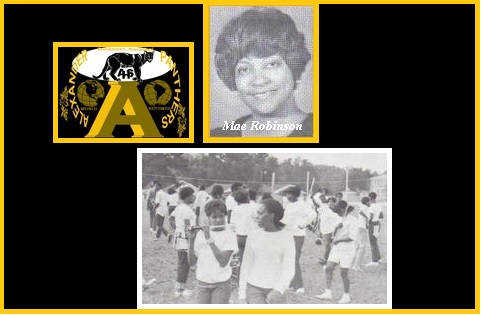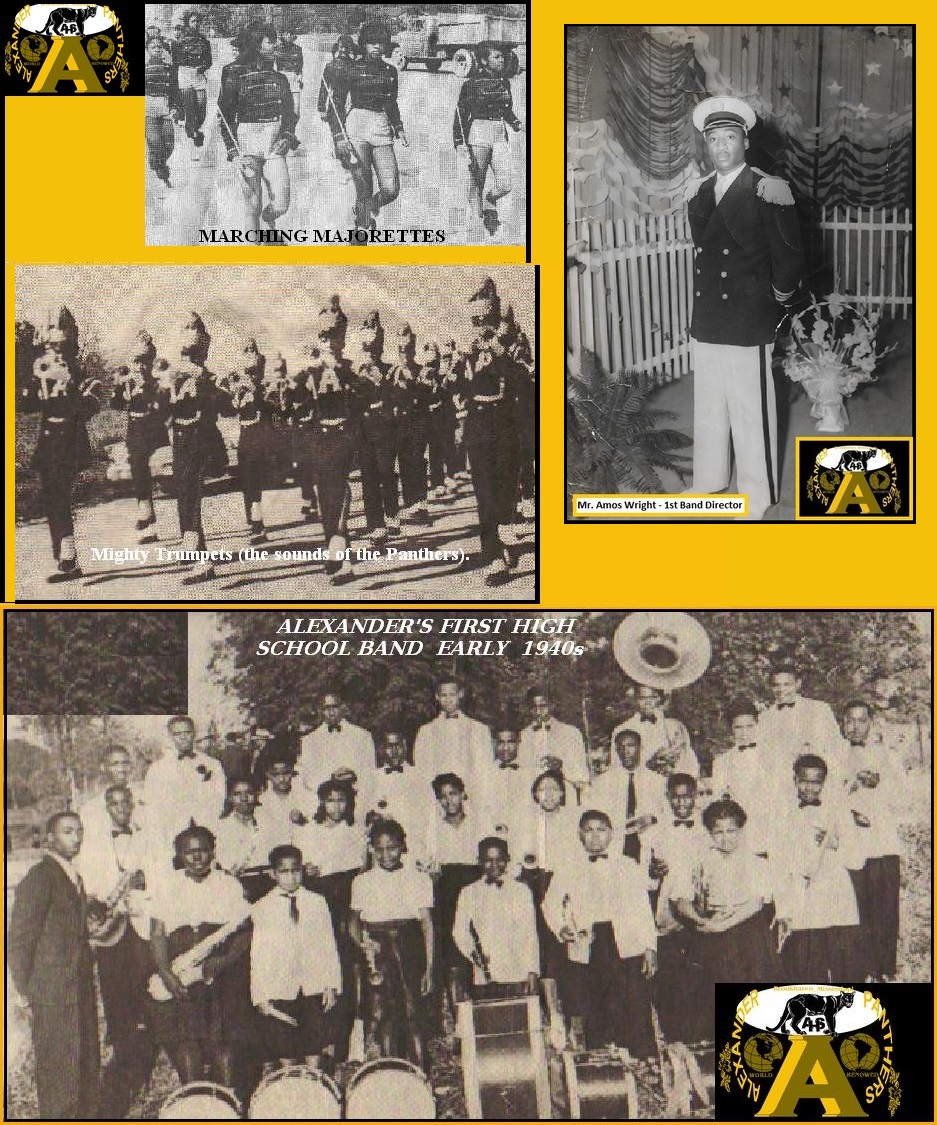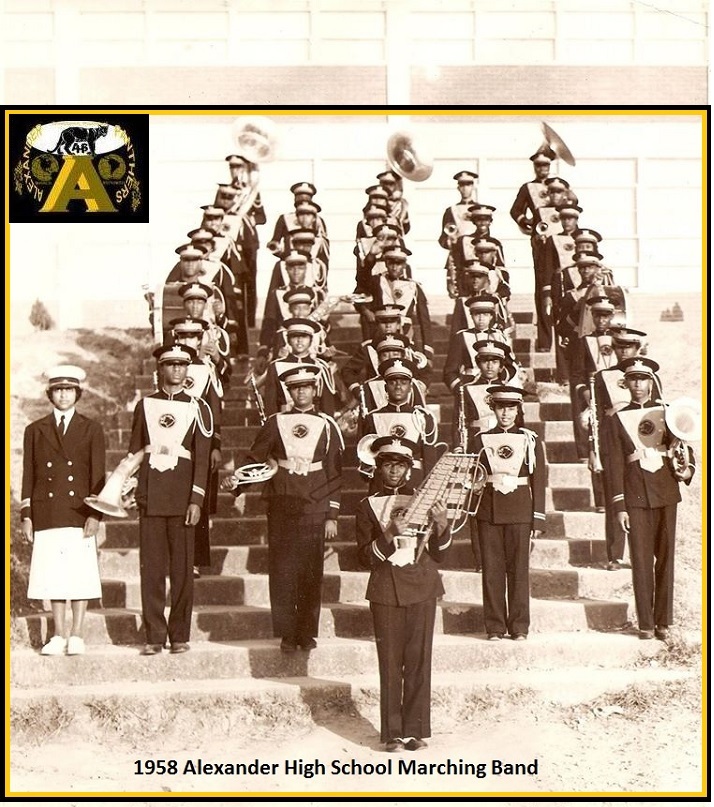*Band*
The Mighty Alexander High School Band.
(Written material courtesy of the DAILY LEADER newspaper July 26, 1996)
"There has never been a band like the Alexander High School band", says Mae Robinson Brown, and she should know. She was the director from 1957 until 1970 - the band's glory years.For miles in all directions people could hear the black and gold, neatly dressed band during a performance, Brown said, and for miles, people would travel to see them. "Some say we were the best," Brown recalls. After taking the band to new heights, she believes no other can ever follow in its place.
Mae Robinson Brown
The first Alexander band was formed around 1940. It wasn't until 1950 that Brown as a student began playing under then-band director Amos Wright.
A graduate of Alexander High School, Brown said most of the kids got in the band were young, but she waited until she was in the ninth grade to play. In a band of 35 students then, her major instrument was the clarinet. Depending on the event, the band performed marches and played classical and pop music.
After the old Alexander school burned in 1952, the new school housed only 7-12, she said, and everyone was allowed in the band.
As Valedictorian, Brown graduated from the school in 1953 and ventured to Southern university in Louisiana as a music major on a music and acedemic scholarship. When she left Brookhaven, AA Alexander was principal of the school that bears his family name. From Southern, she came back to the school as band director in 1957 again under Alexander's leadership. "There were 17 members leftfrom the year before," Brown remembered. And, there were very few band instruments for band members. Her starting salary was $2300 a year. that was a great deal of money for a young, single woman just graduatingftom college.
Over the years, she was able to get a $2500 grant to buy instruments. She spent the the grant on wide range of instruments, including timpani, xylophone, marimba and string bass. Being a student in the band once, Brown felt she not only brought back new energy but, more importantly, audience appeal. She felt it was important to satisfy the audience expectations.
When the band performed at a parade, they marched perfectly and appealed to the spectators, she said. Brown made perfection a common practice rather than an idea. She said the variety she brought to the band was mainly acquiredfrom Southern. However, there were some things her predecessor and mentor, Wright, left that she dared not change. "Mr. Wright was an idea band director. There were some things I adopted from him," she said. When she took the reins. the band played the most current hits, marches and classicals, she said. They performed in parades, half-time shows at football games, pre-game shows before college games, special organizational events, concerts for cities and in district and state contests. "It was a very versatile band," she expressed.
The most spectacular performance, Brown recalled, was at a pre-game show at Jackson State University when the saxophones were spotlighted and the band performed a tune entitled "Little Green Apples." They heard us outside the stadium and they were rushing to get there to see the performance," Brown smiling proudly, said.
During the performance, she said scouts were seeking bands for the presidential inauguration. The Alexander band was recommended, but they could not afford to go, she stated. It was under Brown's direction when the first state band festival for blacks were held in 1958 at Alexander High, she recalls, adding that only the superior and excellent bands from district competitions went to the state contests. In that first festival, Alexander got excellent marks in sight-reading and superior awards in marching and concert. Beginning in 1959, Alexander's band brought home all superior ratings every year in everything including twirling, solos and ensembles while Brown served as director.
In 1963, Alexander became part of the Mississippi High School Activities Association and continued to capture superior marks in every event. In this contest, the sweepstakes award for the best overall band was given. For every year it was issued, while Brown was director, Alexander received it, Brown said. The Band's sight-reading was superb, Brown believes, so much so that the group received a standing ovation from the judges for their sight-reading performance at a state band competition. It was then that Brown realized that hard work was paying off for her and the band. Just as she had hoped, the self-discipline was instilled in members and prayer sessions before playing were merely enhancing their performance, she said.
"I was very firm and authoritarian," Brown said, adding that she never had a discipline problem in all her years as director.
...... (Article continues below.)
She stressed, "practice with understanding makes a good performance. Good enough was never good enough." Brown said the band worked every day after school to perfect its shows. To heighten endurance before a parade, they would sometimes march 15 miles around town with police assistance. People would follow them in the street and spectators, particularly other band directors, would watch them practice. Many would steal their shows, she said. Because the band had a good repertoire, they could easily change the performance. The group worked on a new show every week so no one would get bored, Brown said.
"Everyone wanted to be in the band it was competitive. The kids had to excel and read music well," Brown stated. Not only did the band grow over the years from 17 in 1957, to 100 or "The Marching 100" in 1965, to 130 in 1969, but it was not until Jesse Buie's adminstration that they started to get good band equipment and uniforms, Brown said. By that time they had gone through two sets of uniforms and was preparing to get a third -black tuxedo-like jackets underneath a big 'A" shield on the front. No matter what the uniform the students wore them with dignity, she said.
While Brown was director, the band participated in out-of-state activities, the Rose Bowl, Crewe of Carrollton parade in the Mardi Gras in New Orleans and state fairs. Mae Robinson Brown left the band in 1970.
GO PANTHERS!!!!!!!!!!
This site is maintained by Otis T. Williams Media Syndications and Publication Group Inc.® All copyrights reserved. ©2013-2020.
This site is maintained by Otis T. Williams Media Syndications and Publication Group Inc.® All copyrights reserved. ©2013-2020.




